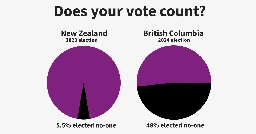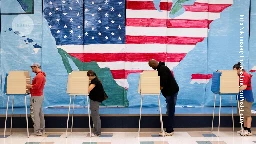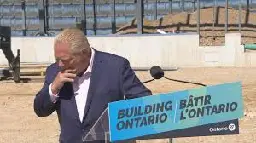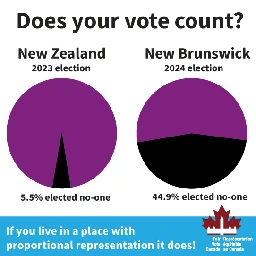Fairvote Canada
- The 219 Corrupt MPs Who Voted Against Advancing Electoral Reform
Results of Motion M-86:
❌219 MPs: 🔴107 🔵111
✅103 MPs: 🔴40 🔵4 ⚪️30 🟠24 ⚫️3 🟢2
❓14 MPs: 🔴9 ⚪️2 🔵2 🟠1
Use Control-F to find your MP:
🔵Conservative:
Poilievre, Hon. Pierre (Carleton)
Aboultaif, Ziad (Edmonton Manning)
Aitchison, Scott (Parry Sound—Muskoka)
Albas, Dan (Central—Okanagan—Similkameen—Nicola)
Allison, Dean (Niagara West)
Arnold, Mel (North Okanagan—Shuswap)
Baldinelli, Tony (Niagara Falls)
Barlow, John (Foothills)
Barrett, Michael (Leeds—Grenville—Thousand Islands and Rideau Lakes)
Berthold, Luc (Mégantic—L'Érable)
Bezan, James (Selkirk—Interlake—Eastman)
Block, Kelly (Carlton Trail—Eagle Creek)
Bragdon, Richard (Tobique—Mactaquac)
Brassard, John (Barrie—Innisfil)
Brock, Larry (Brantford—Brant)
Calkins, Blaine (Red Deer—Lacombe)
Caputo, Frank (Kamloops—Thompson—Cariboo)
Carrie, Colin (Oshawa)
Chong, Hon. Michael D. (Wellington–Halton Hills)
Cooper, Michael (St. Albert–Edmonton)
Dalton, Marc (Pitt Meadows–Maple Ridge)
Dancho, Raquel (Kildonan–St. Paul)
Davidson, Scot (York–Simcoe)
Deltell, Gérard (Louis-Saint-Laurent)
Doherty, Todd (Cariboo—Prince George)
Dowdall, Terry (Burnaby North-Seymour)
Dreeshen, Earl (Red Deer—Mountain View)
Duncan, Eric (Stormont—Dundas—South Glengarry)
Ellis, Stephen (Cumberland—Colchester)
Epp, Dave (Chatham-Kent—Leamington)
Falk, Rosemarie (Battlefords—Lloydminster)
Falk, Ted (Provencher)
Fast, Hon. Ed (Abbotsford)
Ferreri, Michelle (Petersborough—Kawartha)
Findlay, Hon. Kerry-Lynne D. (South Surrey–White Rock)
Gallant, Cheryl (Renfrew—Nipissing—Pembroke)
Généreux, Bernard (Montmagny—L'Islet—Kamouraska—Rivière-du-Loup)
Genuis, Garnett (Sherwood Park—Fort Saskatchewan)
Gladu, Marilyn (Sarnia—Lambton)
Godin, Joël (Portneuf—Jacques-Cartier)
Goodridge, Laila (Fort McMurray—Cold Lake)
Gourde, Jacques (Lévis—Lotbinière)
Gray, Tracy (Kelowna—Lake Country)
Hallan, Jasraj Singh (Calgary Forest Lawn)
Hoback, Randy (Prince Albert)
Jeneroux, Matt (Edmonton Riverbend)
Kelly, Pat (Calgary Rocky Ridge)
Khanna, Arpan (Oxford)
Kitchen, Robert (Souris—Moose Mountain)
Kmiec, Tom (Calgary Shepard)
Kram, Michael (Regina—Wascana)
Kramp-Neuman, Shelby (Hastings—Lennox and Addington)
Kurek, Damien C. (Battle River—Crowfoot)
Kusie, Stephanie (Calgary Midnapore)
Lake, Hon. Mike (Edmonton—Wetaskiwin)
Lantsman, Melissa (Thornhill)
Lawrence, Philip (Northumberland—Peterborough South)
Lehoux, Richard (Beauce)
Leslie, Branden (Portage—Lisgar)
Lewis, Chris (Essex)
Lewis, Leslyn (Haldimand—Norfolk)
Liepert, Ron (Calgary Signal Hill)
Lloyd, Dane (Sturgeon River—Parkland)
Maguire, Larry (Brandon—Souris)
Majumdar, Shuvaloy (Calgary Heritage)
Martel, Richard (Chicoutimi—Le Fjord)
Mazier, Dan (Dauphin—Swan River—Neepawa)
McCauley, Kelly (Edmonton West)
McLean, Greg (Calgary Centre)
Melillo, Eric (Kenora)
Moore, Hon. Rob (Fundy Royal)
Morantz, Marty (Charleswood—St. James—Assiniboia—Headingley)
Morrison, Rob (Kootenay—Columbia)
Motz, Glen (Medicine Hat—Cardston—Warner)
Muys, Dan (Flamborough—Glanbrook)
Patzer, Jeremy (Cypress Hills—Grasslands)
Paul-Hus, Pierre (Charlesbourg—Haute-Saint-Charles)
Perkins, Rick (South Shore—St. Margarets)
Redekopp, Brad (Saskatoon West)
Reid, Scott (Lanark—Frontenac—Kingston)
Rempel Garner, Hon. Michelle (Calgary Nose Hill)
Richards, Blake (Banff—Airdrie)
Roberts, Anna (King—Vaughan)
Rood, Lianne (Lambton—Kent—Middlesex)
Scheer, Hon. Andrew (Regina—Qu'Appelle)
Schmale, Jamie (Haliburton—Kawartha Lakes—Brock)
Seeback, Kyle (Dufferin—Caledon)
Shields, Martin (Bow River)
Shipley, Doug (Barrie—Springwater—Oro-Medonte)
Small, Clifford (Coast of Bays—Central—Notre Dame)
Soroka, Gerald (Yellowhead)
Steinley, Warren (Regina—Lewvan)
Stewart, Jake (Miramichi—Grand Lake)
Strahl, Mark (Chilliwack—Hope)
Stubbs, Shannon (Lakeland)
Thomas, Rachael (Lethbridge)
Tochor, Corey (Saskatoon—University)
Tolmie, Fraser (Moose Jaw—Lake Centre—Lanigan)
Uppal, Hon. Tim (Edmonton Mill Woods)
Van Popta, Tako (Langley—Aldergrove)
Vecchio, Karen (Elgin—Middlesex—London)
Vidal, Gary (Desnethé—Missinippi—Churchill River)
Vien, Dominique (Bellechasse—Les Etchemins—Lévis)
Viersen, Arnold (Peace River—Westlock)
Vis, Brad (Mission—Matsqui—Fraser Canyon)
Wagantall, Cathay (Yorkton—Melville)
Warkentin, Chris (Grande Prairie—Mackenzie)
Waugh, Kevin (Saskatoon—Grasswood)
Webber, Len (Calgary Confederation)
Williams, Ryan (Bay of Quinte)
Williamson, John (New Brunswick Southwest)
Zimmer, Bob (Prince George—Peace River—Northern Rockies)
🔴Liberal:
Trudeau, Right Hon. Justin (Papineau)
Freeland, Hon. Chrystia (University—Rosedale)
Joly, Hon. Mélanie (Ahuntsic-Cartierville)
Ali, Shafqat (Brampton Centre)
Anand, Hon. Anita (Oakville)
Beech, Hon. Terry (Burnaby North—Seymour)
Guilbeault, Hon. Steven (Laurier—Sainte-Marie)
Anandasangaree, Hon. Gary (Scarborough—Rouge Park)
Arseneault, René (Madawaska—Restigouche)
Arya, Chandra (Nepean)
Bains, Parm (Steveston—Richmond East)
Battiste, Jaime (Sydney—Victoria)
Aldag, John (Cloverdale—Langley City)
Bibeau, Hon. Marie-Claude (Compton—Stanstead)
Bittle, Chris (St. Catharines)
Blair, Hon. Bill (Scarborough Southwest)
Boissonnault, Hon. Randy (Edmonton Centre)
Bradford, Valerie (Kitchener South—Hespeler)
Brière, Élisabeth (Sherbrooke)
Chahal, George (Calgary Skyview)
Champagne, Hon. François-Philippe (Saint-Maurice—Champlain)
Chatel, Sophie (Pontiac)
Chiang, Paul (Markham—Unionville)
Cormier, Serge (Acadie—Bathurst)
Damoff, Pam (Oakville North—Burlington)
Dhaliwal, Sukh (Surrey—Newton)
Dhillon, Anju (Dorval-Lachine-LaSalle)
Diab, Lena Metlege (Halifax West)
Drouin, Francis (Glengarry-Prescott-Russell)
Dubourg, Emmanuel (Bourassa)
Duclos, Hon. Jean-Yves (Québec)
Duguid, Terry (Winnipeg South)
Ehsassi, Ali (Willowdale)
El-Khoury, Fayçal (Laval—Les Îles)
Fraser, Hon. Sean (Central Nova)
Fry, Hon. Hedy (Vancouver Centre)
Gaheer, Iqwinder (Misssissauga—Malton)
Gould, Hon. Karina (Burlington)
Hajdu, Hon. Patty (Thunder Bay—Superior North)
Hardie, Ken (Fleetwood—Port Kells)
Hepfner, Lisa (Hamilton Mountain)
Holland, Hon. Mark (Ajax)
Hussen, Hon. Ahmed (York South—Weston)
Hutchings, Hon. Gudie (Long Range Mountains)
Iacono, Angelo (Alfred-Pellan)
Ien, Hon. Marci (Toronto Centre)
Jaczek, Hon. Helena (Markham—Stouffville)
Jones, Yvonne (Labrador)
Khalid, Iqra (Mississauga—Erin Mills)
Khera, Hon. Kamal (Brampton West)
Koutrakis, Annie (Vimy)
Lambropoulos, Emmanuella (Saint-Laurent)
Lamoureux, Kevin (Winnipeg North)
Lapointe, Viviane (Sudbury)
Lattanzio, Patricia (Saint-Léonard—Saint-Michel)
Lauzon, Stéphane (Argenteuil—La Petite-Nation)
LeBlanc, Hon. Dominic (Beauséjour)
Lebouthillier, Hon. Diane (Gaspésie—Les Îles-de-la-Madeleine)
Longfield, Lloyd (Guelph)
MacAulay, Hon. Lawrence (Cardigan)
MacKinnon, Hon. Steven (Gatineau)
Maloney, James (Etobicoke—Lakeshore)
Martinez Ferrada, Hon. Soraya (Hochelaga)
May, Bryan (Cambridge)
McDonald, Ken (Avalon)
McGuinty, Hon. David J. (Ottawa South)
McKay, Hon. John (Scarborough—Guildwood)
McKinnon, Ron (Coquitlam—Port Coquitlam)
Miao, Wilson (Richmond Centre)
Miller, Hon. Marc (Ville-Marie—Le Sud-Ouest—Île-des-Soeurs)
Morrissey, Robert J. (Egmont)
Ng, Hon. Mary (Markham—Thornhill)
O'Connell, Jennifer (Pickering—Uxbridge)
Oliphant, Hon. Robert (Don Valley West)
Petitpas Taylor, Hon. Ginette (Moncton—Riverview—Dieppe)
Powlowski, Marcus (Thunder Bay—Rainy River)
Qualtrough, Hon. Carla (Delta)
Robillard, Yves (Marc-Aurèle-Fortin)
Rodriguez, Hon. Pablo (Honoré-Mercier)
Rogers, Churence (Bonavista—Burin—Trinity)
Romanado, Sherry (Longueuil—Charles-LeMoyne)
Sahota, Hon. Ruby (Brampton North)
Sajjan, Hon. Harjit S. (Vancouver South)
Saks, Hon. Ya'ara (York Centre)
Samson, Darrell (Sackville—Preston—Chezzetcook)
Sarai, Randeep (Surrey Centre)
Scarpaleggia, Francis (Lac-Saint-Louis)
Schiefke, Peter (Vaudreuil—Soulanges)
Sgro, Hon. Judy A. (Humber River—Black Creek)
Shanahan, Brenda (Châteauguay—Lacolle)
Sheehan, Terry (Sault Ste. Marie)
Sidhu, Maninder (Brampton East)
Sidhu, Sonia (Brampton South)
Sorbara, Francesco (Vaughan—Woodbridge)
St-Onge, Hon. Pascale (Brome—Missisquoi)
Sudds, Hon. Jenna (Kanata—Carleton)
Tassi, Hon. Filomena (Hamilton West—Ancaster—Dundas)
Thompson, Joanne (St. John's East)
Valdez, Hon. Rechie (Mississauga—Streetsville)
Vandal, Hon. Dan (Saint Boniface—Saint Vital)
Virani, Hon. Arif (Parkdale—High Park)
Yip, Jean (Scarborough—Agincourt)
Zuberni, Sameer (Pierrefonds—Dollard)
Fonseca, Peter (Mississauga East—Cooksville)
Kusmierczyk, Irek (Windsor—Tecumseh)
O'Regan, Hon. Seamus (St. John's South—Mount Pearl)
Wilkinson, Hon. Jonathan (North Vancouver)
Statement:
Canadians are done with the first-past-the post system as it favours the powerful few over the needs of the many, forcing folks to often choose between 2 bad choices at the ballot or their vote is spoiled. We cannot continue with first-past-the-post as it enables corrupt politicians to vote against a fairer electoral system that would represent 95% of the vote instead of 40%. Canadians deserve a electoral system that will allow them to vote for their favourite candidate and to hold the government accountable without having to vote for the most popular opposition in order to fire the corrupt MPs of the government.
We need to build up the pressure and force the corrupt MPs to listen to the voices of everyday Canadians.
Here's what you can do:
Use Open Parliament to watch their next moves.
Use 338Canada to watch the polls.
Protest against them on the streets.
Hold strikes demanding proportional representation be passed without a referendum, try to push for a national general strike.
Vote them out.
Bring the topic of proportional representation up when meeting with them in person.
Talk to your family, friends and neighbours about proportional representation.
We have more than a year to pass proportional representation, so lets get it done before the next election and force the corrupt MPs to do the right thing and make our democracy fairer.
Sources:
https://docs.google.com/document/d/1REoZ89VAqdcT2eqoGrkQpBOyxUWB9Dioc_-mpgvGZ9g/edit#heading=h.wcvuwdkfukli
https://www.fairvote.ca/21/02/2024/vote-result-mps-from-all-parties-vote-for-motion-m-86-for-a-citizens-assembly-but-not-enough-to-win/
- Why a Right-Leaning Government in New Zealand Built Bike Lanes—and Ontario Plans to Tear Them Downwww.fairvote.ca Why a Right-Leaning Government in New Zealand Built Bike Lanes—and Ontario Plans to Tear Them Down - Fair Vote Canada
First-past-the-post means governments can cater to some voters and ignore the needs of others. Tearing up Toronto's bike lanes is the most recent example.

- When it Comes to Housing, First-Past-The-Post Means Party Firstwww.fairvote.ca When it Comes to Housing, First-Past-The-Post Means Party First - Fair Vote Canada
Proportional representation fosters cooperation, helping to ensure that policies to address long-term problems like the housing crisis have multi-party support.

- The Charter challenge of first-past-the-post could lead to a better electoral systemwww.theglobeandmail.com Opinion: The Charter challenge of first-past-the-post could lead to a better electoral system
The Ontario Superior Court will soon assess the constitutionality of our current electoral system, which has contributed to a significant imbalance among the branches of government

- It’s time for parties in BC to negotiate proportional representationwww.fairvote.ca It’s time for parties in BC to negotiate proportional representation - Fair Vote Canada
Parties that care about a fair and inclusive democracy will know that proportional representation is the first thing to do.

- Letters: We wouldn’t be in this mess with proportional representationwww.coastreporter.net Letters: We wouldn’t be in this mess with proportional representation
'For the umpteenth time, drum roll please, this entire mess could easily have been avoided. If we had a democratic electoral system, i.e. proportional representation, this would not have happened.'

- Which is the fairest electoral system? Mega-election year sparks debatewww.nature.com Which is the fairest electoral system? Mega-election year sparks debate
Proportional representation or winner takes all? Here’s how researchers compare the merits of contrasting voting methods.

>For Drutman, US efforts to incorporate ranked-choice voting can have only a limited effect, and don’t necessarily change the core problem of politics in the country, as he sees it. The system still pushes towards two dominant parties, and avoids proportional representation at the district or state levels. In his view, the goal should be more parties, focused on giving more voters a voice and on building cross-party coalitions, instead of experiments with ranked-choice voting to elect particular candidates. But he does see a positive note from these experiments: “There’s definitely interest in electoral reform.”
- An example from Japan's Proportional Representation system
The ruling coalition in Japan's Lower House is facing a resounding defeat, and an opposition coalition government could be on the horizon.
This was made possible in part by Proportional Representation. Looking at the latest election data:
https://www.nhk.or.jp/senkyo/database/shugiin/00/tousen_toukaku_hirei.html
The ones with a white cell on the right column are PR representative-elects, and grey cells are the candidates that won their local district in a traditional tally.
One major beneficiary is the Japanese Communist Party (violet), who only won 1 race in the FPTP portion, but because they had sizeable supports nation wide, has 7 total seats at the governing table.
This doesn't only help 3rd parties. The incumbent (red) and leading opposition (blue) parties locked in dead heats in many races, have elected some candidates from the PR field. That way the voice of the group that made 2nd place are not fully lost on the final result.
- 2007 Ontario electoral reform referendum
The proposal was defeated, with 36.8% of the valid votes cast supporting MMP, and 63.2% in favour of retaining FPTP.
Referendums often fail as the fear mongering from the powerful few is very effective.
This why we the people must demand our representatives pass pr through multi-party support. As we have voted them in already.
- Our Democratic Futures : Proportional Representation for the US, the UK and Canada - Fair Vote Canada

YouTube Video
Click to view this content.
>Canada, the US and the UK all suffer the consequences of winner-take-all voting systems that distort election results, polarize politics and shut voters out. > >In this webinar, leading experts and campaigners for proportional representation from Canada, the US, and the UK, discuss the issues each country has with their winner-take-all elections, how transitioning to proportional representation can help address these issues, and what the routes to reform in each country look like. > >Co-sponsored by: > >Fair Vote Canada: https://www.fairvote.ca/ >ProRep Coalition (California): https://www.prorepcoalition.org/ >Make Votes Matter (UK): https://makevotesmatter.org.uk/
- 5 Doug Ford Policies That Might Not Have Passed if Ontario Had PR - Fair Vote Torontowww.fairvotetoronto.ca 5 Doug Ford Policies That Might Not Have Passed if Ontario Had PR - Fair Vote Toronto
Global News recently reported that the Progressive Conservative Party will begin nominating candidates this month, the latest sign that Premier Doug Ford is considering a snap vote. In 2022, the PCs formed a second “false majority” government after winning just … Read More

>Global News recently reported that the Progressive Conservative Party will begin nominating candidates this month, the latest sign that Premier Doug Ford is considering a snap vote. > >In 2022, the PCs formed a second “false majority” government after winning just 41% of the vote. Given that progressive parties—the OLP, ONDP, and GPO—received a combined 54% of the vote, it seems Ontario’s democratic majority was once again denied its right to govern. > >What made the situation even more dire, however, was the historically low voter turnout of 43%, which meant Ford was handed a majority government by a meagre 18% of eligible voters. These results spell a crisis of legitimacy for our democracy, especially when it comes to the legislation passed by such a government. > >For instance, in 2019, the PCs passed Bill 124, which capped salary increases for broader public sector workers (including teachers and nurses) to 1% per year for three years. It was later deemed unconstitutional by the Ontario Court of Appeal, which ruled that it violated the Charter of Rights and Freedoms with respect to unionized employees. > >Here is a list of other legislation passed by the PCs that might not have come into force under PR: > >1. Bill 60: Your Health Act (May 2023) allowed private clinics to conduct more OHIP-covered surgeries despite critics warning that it would lead to a two-tiered system. At the time, the NDP said it presented 74 amendments to the Your Health Act to the committee, but none were accepted or even considered by the PCs. >2. Bill 3: Strong Mayors, Building Homes Act (Sept 22) gave mayors more power by allowing them a veto on bylaws passed by council, the ability to hire and dismiss senior managers, and stewardship over the city budget. While municipal powers are determined by the provincial government, the bill is widely seen as a continuation of the erosion of municipal powers and councillors, who are elected by citizens to exercise their democratic will. >3. Bill 39: Better Municipal Governance Act (2023) extended “strong mayor” powers to other municipalities. Opposition parties were critical of how it allowed mayors to pass certain bylaws with just one-third of council support. >4. Bill 23: More Homes Built Faster Act (2022) reduced development fees (to boost construction) despite significant opposition from environmental groups, municipal governments, and Indigenous communities. >5. Bill 7: More Beds, Better Care Act (2022) allowed hospitals to free up hospital beds by discharging elderly patients to long-term care homes without their consent. The bill faced backlash for infringing on patient rights. > >Finally, while not a legislative bill, the Greenbelt land swap scandal raised significant issues in 2023 when the Ford government came under scrutiny for opening up previously protected Greenbelt land for development against the will of elected municipal councillors. The Auditor General’s report revealed that the process disproportionately favoured certain developers...
- Single Transferable vote is the way go for ranked ballots

>Some Liberal politicians say winner-take-all ranked ballot will make politics more “cooperative” or deliver fairer results. But in Australia, winner-take-all ranked ballot has locked in a two party system, created politics that is just as aggressive as ours, and led to climate policy failure. The current “majority” government was elected with 32.8% of first choice votes
- New Brunswick election: Liberal majority with 48% of the vote - Fair Vote Canadawww.fairvote.ca New Brunswick election: Liberal majority with 48% of the vote - Fair Vote Canada
The New Brunswick election saw the Liberal Party form a majority with 48.2% of the vote. The Green Party got 13.8% of the vote but only two seats.

> Only 48.2% of New Brunswick voters supported the New Brunswick Liberals, yet the voting system has handed Susan Holt’s Liberals 63.3% of the seats and 100% of the power. > > The election results were a misrepresentation of what voters said with their ballots: > - The Liberals got 63.3% of the seats with 48.2% of the vote. > - The Progressive Conservatives got 32.7% of the seats with 35.0% of the vote. > - The Greens got only 4.1% of the seats with 13.8% of the votes, electing only 2 MLAs to represent their 51,523 voters. > - About 44.9% of voters – 168,429 – cast wasted votes that elected no-one. > > With proportional representation, where the seats in the New Brunswick legislature matched the popular vote, no single party would have had all the power and parties would have had to work together in the legislature. > > First-past-the-post makes New Brunswick appear more divided along linguistic lines than it actually is. The 16 PC seats are all in the English-speaking ridings, so the Liberal victory is in the francophone ridings plus six in Saint John and three in Fredericton. With proportional representation, all three parties will have elected MLAs in all areas of the province. > > “Once again, our voting system has distorted the will of the people,” said Vivian Unger, from Fair Vote New Brunswick. This time, it gave the Liberals a majority with 48.2% of the vote. I congratulate the Liberals on their win, but I’d also like to remind them of that time in 2018 that they got the most votes but lost the election. This time, they were running against a very unpopular Premier, and that helped them out. That’s not something they can count on in the future. I hope this win will not prevent them from holding that citizens’ assembly on electoral reform, ASAP. Their members voted for it.” > > The New Brunswick Greens put proportional representation in their election platform. For the sake of all New Brunswick voters, it’s time for the New Brunswick Liberals to put proportional representation on their agenda.
- First-past-the-post election leaves BC more polarized - Fair Vote Canadawww.fairvote.ca First-past-the-post election leaves BC more polarized - Fair Vote Canada
BC's 2024 first-past-the-post election has robbed voters of choice, polarized communities, and when it comes to the biggest issues, resolved nothing.

> While British Columbians wait with baited breath for the final results from BC’s provincial election, one thing is clear: First-past-the-post has robbed voters of choice, deeply polarized communities, and when it comes to the biggest issues facing British Columbia, resolved absolutely nothing. > > BC Conservative leader John Rustad’s election night speech captured the sorry state of affairs: > >> “If we are in that situation of the NDP forming a minority government, we will look at every single opportunity from day one to bring them down …and get back to the polls.” > > A leader whose party received 44% of the popular vote vowing to do everything in his power to ensure the legislature doesn’t work for the majority, gunning for the next chance to seize all the power with less than half of the vote, is a brutal, yet predictable outcome of first-past-the-post. > > If the supposed advantages of our winner-take-all system are its ability to cater to the centrist voter, ensure “strong, stable majority governments”, prevent “backroom deals”, deliver fast results on election night, and keep out extremists, it has failed utterly on all counts―all at once. > > BC’s election has exposed these claims for what they are: at best, misleading talking points from those who haven’t reviewed the evidence, and at worst, deliberately dishonest assertions from shallow politicians who consistently put their own ambitions of power ahead of the public interest when it comes to electoral reform...
- BC Political Parties on Electoral Reform
BC Green Party:
In their statement, the Greens make two key promises of special interest to electoral reformers:
introduce legislation to implement a Proportional Representation system for the 2028 election
establish a biennial Citizens’ Assembly, with the first topic to be discussed [being] the type of voting system to adopt for the 2028 election In the democracy section of their platform, the Greens reiterate these promises to implement proportional voting in 2028 and to establish a biennial Citizens' Assembly. In addition, they propose to lower the voting age to 16, reform parliamentary practices to promote transparency and encourage collaboration between parties, and change executive practices to proactively release information and support meaningful consultation.
BC NDP:
Under the Effective Government section of their platform, makes no mention of voting or campaign financing issues.
Conservative Party of BC:
We could find no reference to voting or campaign financing issues on the CPBC platform.
BC United:
Although BC United has withdrawn from this election, several former candidates are running as independents. The BC United "Where We Stand" page does not list any democratic-reform-related issues.
More broadly, CBC has published a brief overview of the parties' positions on a number of issues, though not on anything related to democratic reform.
In summary, of the parties and candidates running in this year's election, only the BC Greens have shown any recognition of the need for democratic reform. We recommend that voters take this into consideration in determining who to vote for.
If you would like to sign up for updates from Fair Voting BC, join here.
- Proportional representation decreases political polarizationwww.fairvote.ca Proportional representation decreases political polarization - Fair Vote Canada
Growing political polarization - "us vs them" - is a concern in Canada. Research shows proportional representation can decrease partisan hostility.



















